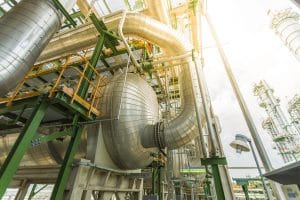 There are many different reasons for companies to upgrade to heat exchangers, such as more reliable electrical thermal management and a lower overall environmental footprint. However, one of the most beneficial reasons is the fact that heat exchangers can continuously operate for years with minimal need for maintenance, upkeep, repairs, or replacement. Because companies that operate around the clock rely on the efficiency of their technology, the need for lower maintenance thermal management solutions is substantial enough that heat exchangers have become one of the most impactful technologies in most industries. (more…)
There are many different reasons for companies to upgrade to heat exchangers, such as more reliable electrical thermal management and a lower overall environmental footprint. However, one of the most beneficial reasons is the fact that heat exchangers can continuously operate for years with minimal need for maintenance, upkeep, repairs, or replacement. Because companies that operate around the clock rely on the efficiency of their technology, the need for lower maintenance thermal management solutions is substantial enough that heat exchangers have become one of the most impactful technologies in most industries. (more…)
The Main Benefits of Ambient Heat Exchangers
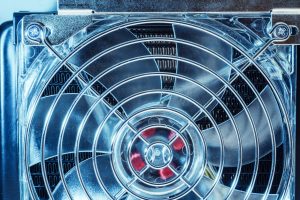 As electronic devices and machines grow increasingly more powerful, it may seem like the only way to keep them effectively cooled is to come up with ways to chill their components. However, rather than invent miniature air conditioners, innovators of advanced technology often rely on heat exchanger technology that doesn’t chill enclosures at all. On the contrary, ambient heat exchangers cool the air within electrical enclosures to a temperature that’s just above the ambient temperature outside of them. This gives them the ability to stop technology from overheating no matter how powerful it is, all without having to work around cumbersome air conditioners. (more…)
As electronic devices and machines grow increasingly more powerful, it may seem like the only way to keep them effectively cooled is to come up with ways to chill their components. However, rather than invent miniature air conditioners, innovators of advanced technology often rely on heat exchanger technology that doesn’t chill enclosures at all. On the contrary, ambient heat exchangers cool the air within electrical enclosures to a temperature that’s just above the ambient temperature outside of them. This gives them the ability to stop technology from overheating no matter how powerful it is, all without having to work around cumbersome air conditioners. (more…)
3 Things that Make Heat Exchangers Work for Computers
 Decades ago, heat exchangers changed the way large manufacturing equipment and electrical control panels were cooled. Today, however, they do much more than replace industrial air conditioning units; they also play a vital role in many of today’s most advanced technologies. For example, computer technology has long relied on efficient, miniaturized thermal management solutions such as heat exchangers to continue growing more powerful without having to grow more spacious. While the applications may be different, heat exchangers that are used for high-performance computing technology bring the same benefits that they do for larger-scale solutions. (more…)
Decades ago, heat exchangers changed the way large manufacturing equipment and electrical control panels were cooled. Today, however, they do much more than replace industrial air conditioning units; they also play a vital role in many of today’s most advanced technologies. For example, computer technology has long relied on efficient, miniaturized thermal management solutions such as heat exchangers to continue growing more powerful without having to grow more spacious. While the applications may be different, heat exchangers that are used for high-performance computing technology bring the same benefits that they do for larger-scale solutions. (more…)
Industrial Uses for Modern Heat Exchangers
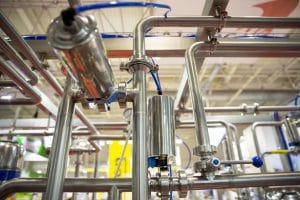 Heat exchangers are a great option for reducing energy costs on a company’s thermal management needs. Yet, it’s their versatility and ability to meet a wide range of thermal management needs that makes heat exchangers useful to virtually every industry. With the benefits that come from more streamlined and eco-friendly heat transfer processes, a large variety of companies can benefit in an even larger variety of ways, from more reliable electrical thermal management to ensuring product quality and more. (more…)
Heat exchangers are a great option for reducing energy costs on a company’s thermal management needs. Yet, it’s their versatility and ability to meet a wide range of thermal management needs that makes heat exchangers useful to virtually every industry. With the benefits that come from more streamlined and eco-friendly heat transfer processes, a large variety of companies can benefit in an even larger variety of ways, from more reliable electrical thermal management to ensuring product quality and more. (more…)
Do Heat Exchangers Really Work in Hazardous Conditions?
 When it comes to nearly all forms of manufacturing and all types of industries, the benefits of heat exchangers are so well-known and widespread that most companies have adopted them in a wide variety of forms. To spread those benefits even further, heat exchangers have also advanced enough to operate reliably and efficiently in hazardous locations, where they weren’t always a viable solution. With the ability to dramatically reduce and streamline electrical and other thermal management needs, companies that operate in hazardous locations can enjoy the same benefits that companies in most other industries have enjoyed for decades. (more…)
When it comes to nearly all forms of manufacturing and all types of industries, the benefits of heat exchangers are so well-known and widespread that most companies have adopted them in a wide variety of forms. To spread those benefits even further, heat exchangers have also advanced enough to operate reliably and efficiently in hazardous locations, where they weren’t always a viable solution. With the ability to dramatically reduce and streamline electrical and other thermal management needs, companies that operate in hazardous locations can enjoy the same benefits that companies in most other industries have enjoyed for decades. (more…)
Things Heat Exchangers Are Used For
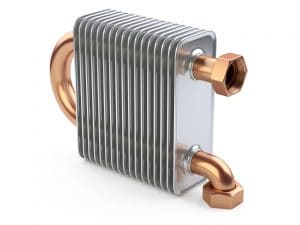 Today, heat exchangers are such an integral thermal management technique that they’ve become a staple in clean, eco-friendly, and energy efficient technologies of all kinds. The secret to their success is the innovative way in which heat exchangers stop systems from overheating by absorbing and transferring waste heat. At first, this ability made heat exchangers excellent alternatives to methods like air conditioning, which used to be standard for cooling most electrical systems. Now, however, that same high heat transfer ability has been applied to a wide variety of applications, each one made possible by the advent of heat exchangers. (more…)
Today, heat exchangers are such an integral thermal management technique that they’ve become a staple in clean, eco-friendly, and energy efficient technologies of all kinds. The secret to their success is the innovative way in which heat exchangers stop systems from overheating by absorbing and transferring waste heat. At first, this ability made heat exchangers excellent alternatives to methods like air conditioning, which used to be standard for cooling most electrical systems. Now, however, that same high heat transfer ability has been applied to a wide variety of applications, each one made possible by the advent of heat exchangers. (more…)
Faster Heat Exchanger Production with In-House Manufacturing
 Much like the thermal management solutions they produce, today’s heat exchanger manufacturers have taken leaps and bounds in optimizing their processes thanks to advanced technology. For example, digital design and analysis technology has allowed for increasingly higher precision and, consequently, more effective results in the design and creation of innovative heat exchangers. Likewise, automated technology and smaller, more powerful manufacturing equipment allows for companies to combine every step of the heat exchanger manufacturing process in-house. (more…)
Much like the thermal management solutions they produce, today’s heat exchanger manufacturers have taken leaps and bounds in optimizing their processes thanks to advanced technology. For example, digital design and analysis technology has allowed for increasingly higher precision and, consequently, more effective results in the design and creation of innovative heat exchangers. Likewise, automated technology and smaller, more powerful manufacturing equipment allows for companies to combine every step of the heat exchanger manufacturing process in-house. (more…)
Could Heat Exchangers Help Impact Rising Medical Costs?
 These days, every industry feels the pressure of rising costs across the board, from energy and operating costs to raw materials and labor. However, few industries compare to the skyrocketing prices that ripple throughout the healthcare industry, which is why it is one of the most important fields in which to implement more efficient, reliable, and cost-effective solutions wherever possible. Because of this, heat exchangers have proven especially beneficial for hospitals and other healthcare organizations, as well as the companies that produce the high-performance technology used throughout such facilities. (more…)
These days, every industry feels the pressure of rising costs across the board, from energy and operating costs to raw materials and labor. However, few industries compare to the skyrocketing prices that ripple throughout the healthcare industry, which is why it is one of the most important fields in which to implement more efficient, reliable, and cost-effective solutions wherever possible. Because of this, heat exchangers have proven especially beneficial for hospitals and other healthcare organizations, as well as the companies that produce the high-performance technology used throughout such facilities. (more…)
Is Convection Really Enough to Cool Control Panels?
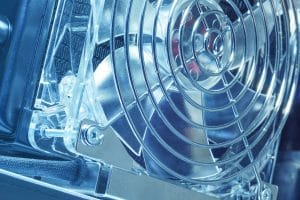 The most energy efficient way to prevent something from overheating is to allow heat to dissipate away from it. If it were possible to leave electronic components out in the open, then innovative thermal management solutions wouldn’t be as vital to modern technology. However, air-to-air heat exchangers often come as close as possible by utilizing natural and forced convection to prevent heat pockets from forming within electrical enclosures. For many applications, this is more than enough to keep technological equipment running continuously with minimal risks of heating issues, and with a minimal need for additional energy consumption. (more…)
The most energy efficient way to prevent something from overheating is to allow heat to dissipate away from it. If it were possible to leave electronic components out in the open, then innovative thermal management solutions wouldn’t be as vital to modern technology. However, air-to-air heat exchangers often come as close as possible by utilizing natural and forced convection to prevent heat pockets from forming within electrical enclosures. For many applications, this is more than enough to keep technological equipment running continuously with minimal risks of heating issues, and with a minimal need for additional energy consumption. (more…)
2 Reasons Automated Tech Relies on Heat Exchangers
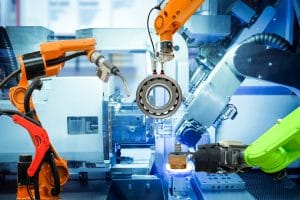 While automated technology has largely taken over a significant portion of many industries, its wide spread adoption was the culmination of several different technological developments. One of those is the ability to streamline electrical thermal management to provide constant, reliable cooling for technology that’s meant to run on its own. Besides creating technology that’s smart and powerful enough to make automation possible, such technology also requires equally smart and powerful solutions for dealing with electrical overheating. Because of their unique methods of transferring heat, heat exchangers have often been the most-relied upon thermal management solution for increasingly more advanced automated technology. (more…)
While automated technology has largely taken over a significant portion of many industries, its wide spread adoption was the culmination of several different technological developments. One of those is the ability to streamline electrical thermal management to provide constant, reliable cooling for technology that’s meant to run on its own. Besides creating technology that’s smart and powerful enough to make automation possible, such technology also requires equally smart and powerful solutions for dealing with electrical overheating. Because of their unique methods of transferring heat, heat exchangers have often been the most-relied upon thermal management solution for increasingly more advanced automated technology. (more…)







